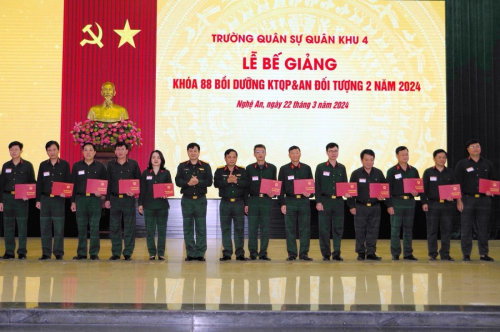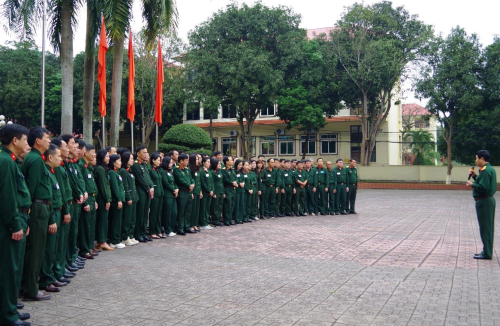Grasping and seriously implementing resolutions and directives by the Party, Central Military Commission, Ministry of National Defence, and Military Region 4 on defence and security education, over the years, in addition to the training and retraining of non-commissioned officers and technical staff for units of the Military Region’s armed forces, Military Region 4’s Military School (hereinafter referred to as the School) has actively, proactively carried out the work of defence and security education. A part from advantages, the School has to deal with a massive flow of learners on a yearly basis, with different educational backgrounds, ages, and positions; meanwhile, the training scale of the School is limited, and its facilities, training grounds, and teaching equipment have been in use for ages and thus considerably deteriorated. Besides, other schools affiliated with it are scattered in a large area, thereby causing a lot of difficulties in coordination work. Against that backdrop, the Party Committee and Board of Directors of the School have synchronously taken effective measures to promote the synergy, gradually settle difficulties, and create a solid positive change in the performance of the tasks assigned by the Military Region’s Defence and Security Education Council.
 |
| Graduation ceremony for learners from the 2nd group |
First of all, the School has enhanced all-level party committees and commands’ leadership and direction over a reform in defence and security education. Thoroughly grasping higher echelons’ documents on defence and security as well as directives and guidance by the Military Region’s Defence and Security Education Council, the School’s Party Committee and Board of Directors have considered defence and security education as a central political task and concretised it into resolutions, while assigning their members to directly lead, direct, and inspect this task, requiring party committees and commands at all levels, particularly Defence and Security Education Centre to promote a sense of responsibility in the process. To meet the increasingly demanding task requirements, the School has actively organised specialised conferences, forums, and dialogues with localities, universities, and colleges in order to bring into play democracy and collective knowledge in proposing measures to raise the quality of defence and security education.
Adhering to measures and targets set in resolutions and plans of the Military Region’s Defence and Security Education Council, the School has directed its Training Department and Defence and Security Education Centre to coordinate with provinces and units in the area as well as universities and colleges as its partners in identifying time and number of learners and making education plans scientifically, properly. Grounded on coordination work, it has made preparation for receiving learners, consolidated accommodation and facilities for learners in accordance with the characteristics and defence and security tasks of the Military Region.
To well perform tasks without any increase in its workforce, the School has adopted breakthrough measures to develop a contingent of instructors of defence and security education with standard professional knowledge, good teaching skills, and great hands-on experience. Implementing the Project on “building a pool of teachers and educational managers within the Military to meet the requirements of a fundamental and comprehensive reform in education and training in the period of 2021 – 2030”, the School has closely cooperated with competent offices of the Military Region in formulating personnel plans and comprehensively improving its teaching staff’s competence, with importance attached to building a core force in defence and security education. Over the years, the School has selected and deployed its cadres and instructors to specialised training courses and units across the Military, thereby enabling them to acquire practical knowledge and hands-on experience. Moreover, the School has invited leaders of the Military Region, competent offices, the Public Security Force, and the Border Guard Force, and members of the Board of Directors to deliver specialised topics to equip its cadres and instructors with new knowledge and information, while maintaining Good Defence and Security Education Instructor Contests at all levels as an important channel for assessing and classifying its teaching staff and a significant basis for appointing and further training its instructors. In addition, the School has expanded its relations with other military schools and universities in the area, organised visits and exchange programs to enable its teaching staff to develop their professional competence ad methods.
 |
| Disseminating the School’s tradition among learners |
Due to the short period of a defence and security education course with a great amount of knowledge and the increasingly higher requirements, the School has actively reviewed and standardised defence and security education programs, updated and supplemented the content of those programs, and renewed teaching methods in accordance with each group of learners. Emphasis has been placed on reviewing and formulating detailed training programs, and updating training documents based on each topic in accordance with local particularities and groups of learners. Offices and faculties of the School have frequently grasped the situation and integrated new points relating to national defence and security, particularly the Party and State’s viewpoints, guidelines, and policies on military, defence, security, and Fatherland protection tasks into teaching and learning programs. In the teaching process, due attention has been paid to providing new information about defence and security and making a multidimensional analysis of new, sensitive matters to improve learners’ knowledge.
While standardising its training programs, the School has conducted a methodological reform “towards reality and groups of learners”, closely combined theory with practice, and established a link between lectures and military and defence work, political security, and socio-economic situation in the Military Region’s area. The School has enhanced the application of information technology and learner-centred approach and flexibly combined presentation with debate and discussion to reduce the one-way transmission of knowledge. To align theory with practice, the School has actively renewed the organisation of extra-curricular activities in accordance with each group of learners. As for the 2nd group of learners, in addition to enhancing debate and discussion to enable learners to link theoretical knowledge with their work position, the School has actively cooperated with offices, units, and localities to organise visits to defensive zone exercises and models of economic development associated with defence and security so that its learners would more clearly understand the armed forces’ tasks and the Party’s military and defence guidelines. As for students, the School has directed its Defence and Security Education Centre to cooperate with universities and colleges to closely combine education and discipline management, thereby creating a military environment for students’ experience. At the same time, the School has enhanced extra-curricular activities, such as organising visits to units within the School and localities with training and combat readiness operations, holding contests, thus stimulating their interest in study and training, enabling them to grasp the basics of their training course, helping them understand and treasure the value of peace, raising their responsibility for the task of Fatherland protection.
A part from the above-mentioned measures, the School has mobilised all resources to gradually modernise teaching equipment. As its facilities and teaching equipment have yet to keep pace with its task development, the School has made and implemented effective exploitation plans. Besides, it has actively mobilised resources to improve its operating hall, specialised classrooms, and training grounds, while digitalising its training documents as the basis for developing database for teaching and learning. It has proactively reviewed and completed safety regulations to exploit its local area network, military network, and the Internet, create a favourable condition for applying information technology to teaching and research, and step by step modernise equipment for raising the quality of teaching. Up to now, it has basically accomplished investments in its operating hall, specialised classrooms, and training grounds; all instructors have been equipped with computers connected to the Internet; the system of lesson plans and documents has been digitalised to serve a reform in education and training in general, defence and security education in particular.
Thanks to synchronous, scientific measures, the quality of defence and security education within the School has been unceasingly raised. Since 2022, the School has provided defence and security education for over 1,000 learners from the 2nd group and nearly 5,000 students, all of them have got pass, all learners from the 2nd group have achieved merit or distinction. Cadres as learners from the 2nd group after their training course at the School have well performed their role in giving advice and direction to defence and security work of their localities, thus significantly contributing to fostering socio-economic development, strengthening defence and security, and building strong all-people national defence and people’s security in the Military Region’s area.
With the pride of a unit stationed in the hometown of beloved President Ho Chi Minh, Military Region 4’s Military School will continue to improve the quality of defence and security education to make contributions to local party committees, authorities, armed forces, and people’s successful fulfilment of military, defence, Fatherland protection tasks.
Sr. Col. HOANG VAN SINH
Commandant of the School